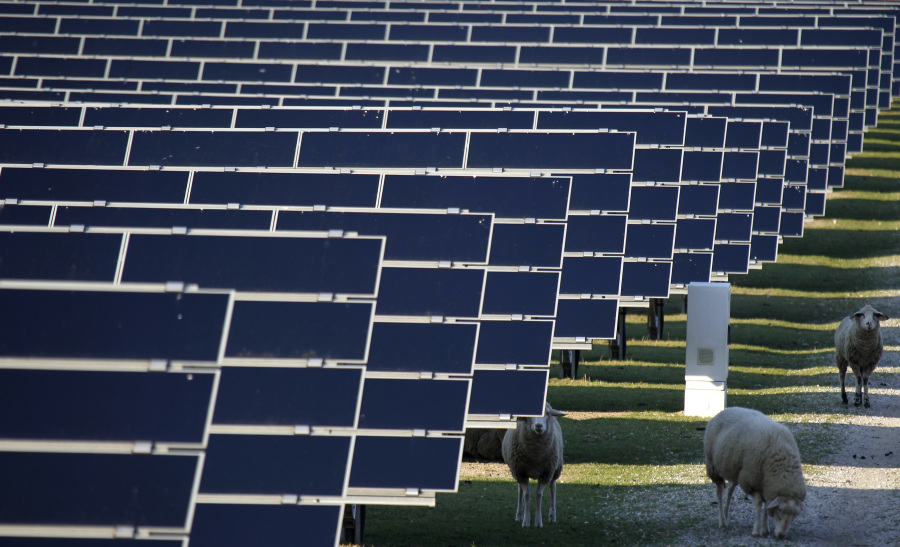
As we embark on the new year, renewable energy is flourishing across the world with innovative projects from Northern California to Chile and from Japan to Johannesburg. Diverse endeavors everywhere are showing ways we can end our fossil fuel dependency to ensure the climate remains habitable.
A low carbon breakthrough is needed now more than ever, as we've just lived through what scientists say has been the hottest year on record amid an ongoing violent upsurge in global warming-related disasters, substantiating the ever-graver warnings about climate change put forward by the UN's Intergovernmental Panel on Climate Change.
This year, renewed expectations for global action will focus on the COP 21 climate summit in Paris in December. To date, Big Oil’s political power has resulted in over two decades of hot air coming from international meetings such as these. The difference now, though, is that the arguments – and rational excuses – to obstruct the global shift to renewable energy are running out.
Clean Energy Flourishes
In Europe, there are numerous countries exemplifying both fossil dependency and the ability to think beyond it. Continent-wide statistics show that clean technologies now account for 23% of power generation – 3% more than the previous year. Austria and Sweden led this surge, with 68% and 67% powered by renewables, respectively.
Nine other countries produce between a quarter and half of their electricity from renewables, including Denmark, Portugal and Germany. Meanwhile, Spain hit all-time highs in wind energy generation; coupled with its growing solar photovoltaics (PV) and thermal solar production, the country cut 23% of annual greenhouse gas emissions from its power sector.
Scotland too is breaking records. During the first half of 2014, renewables overtook nuclear and fossil fuel production in Scotland, with wind at the fore of its power generation – backing the country’s aims to become renewable-sufficient in the next decade.
New Horizons for Clean Tech
Germany and Japan, like Scotland, are both setting high renewable targets. All three will soon decommission nuclear power, motivated by the catastrophic Fukushima disaster in 2011.
In the first year of its shift toward greater renewable reliance, Japan increased its clean-tech capacity by 15%. Growth in domestic solar production was aided by feed-in tariff support, while its increase in clean energy was also boosted by novel floating offshore wind turbines and ocean solar plants, built on reclaimed land.
The Fukushima disaster also catalyzed German plans for its Energiewende, or Energy Transition. Aiming to get beyond nuclear power within a decade, the plan calls for massive reductions in greenhouse gases and staggered targets for increasing renewables – to more than 35% of overall usage by 2025, over 55% by 2035, and over 80% by 2050. The impact is already apparent, as Germany's clean energy production out-powered coal and nuclear for the first time in early figures for 2014.
Reacting to the shift, E.ON, Germany’s largest energy company, has split its business into two firms: one directing clean energy, power grids and energy efficiency services, and the second concentrating on fossil fuels. This move shows how even profit-focused corporations are making preparations for the gradual demise of fossil fuels, and other national energy providers are following suit.
But European countries are far from alone in their renewable energy advances. Kenya plans to triple its energy generation in five years, with 90% coming from geothermal, solar and wind. Across its northern border, Ethiopia aims to expand geo-thermal capacity ten-fold with the building of the 70 megawatt Aluto-Langano geothermal power plant.
Low carbon breakthroughs are happening elsewhere across the global south. Chile will soon build the same amount of solar PV production as half a nuclear generator can produce, and will construct a concentrating solar power plant in Cerro Dominador that harnesses the sun’s power 24 hours a day. Peru is focusing small-scale but in a big way – installing solar panels on 2 million citizens' homes for free. Off-grid renewables are also bringing electricity to rural India, where campaigner Debi Goenka asserts it is now cheaper to reach rural people with renewable energy than with fossil fuels.
Everywhere Has Potential
Different swathes of the world have diverse untapped potential. Kenya, Ethiopia and other countries in the Rift Valley, for instance, have great scope for geothermal in addition to solar. Global mapping shows that almost all the world has either good potential for solar, offshore wind, onshore wind, tidal power, or geothermal.
A shift to renewables can also follow different routes. Early starter Denmark combined two paths, beginning its own energy revolution three decades ago. First, innovators and activists began building wind turbines through energy cooperatives. Following that success, the government decided to abandon nuclear for renewable power in the mid-1980s, lending support through subsidies and tax credits.
Lowering carbon emissions also requires energy efficiency and reductions in demand. On top of this, other implementations can accelerate progress, like sharing power across borders through the integration of power networks.
"Cut the Green Crap"
Pushing in the opposite direction by attacking green subsidies, the U.K. coalition government recently asserted, “We need to get rid of the green crap.” These comments epitomize the Westminster-City of London fossil fuel fixation, shown in its desire for a U.K.-wide "fracking revolution" and the financial backing the City gives to Big Oil.
The governments of Canada, Australia and the United States also seem transfixed by carbon intensive industries. Australia’s Prime Minister asserts: “Coal has a big future as well as a big past.” The Prime Minister of Canada, Stephen Harper, has described regulating tar sands as “crazy." And while Obama’s administration may still veto the Keystone XL Pipeline to block the transport of Alberta tar sands oil south to the Gulf of Mexico, it fully supports extending fracking across America, which also imperils the climate.
Big Oil’s close ties to these national administrations represents just one aspect of the "Get rid of the green crap" mentality as articulated in the U.K. For instance, Britain’s current administration is littered with fracking industry supporters who hold central positions of power – not least, the unelected Lord Browne. The Lord could be to British government what Dick Cheney was to the previous U.S. administration: not only does he have personal fracking interests, but he's been tasked with overseeing the industry’s regulation.
Pro-fossil fuel policies include lobbying against effective climate measures – for instance, Britain and Canada’s partnership to prevent the E.U. from effectively banning tar sands. Lobbies in the U.S. and other petro-states are in full swing to weaken any potential landmark agreement at the COP 21.
Another example of anti-green measures is seen in the U.K.'s local government minister Eric Pickles. Pickles could be described as a one-man block to climate change action. Figures show he blocked over 86% of new wind farm applications in the U.K. last year.
Another tactic to quash renewables is to simply keep talking up the fossils. The tidal industry in Britain could be central in Britain’s energy future if it was only given the official backing that fracking receives. Similarly in Canada, the think-tank Clean Energy criticizes the government for its notable lack of support for clean technologies – even though those technologies employ more Canadians than the tar sands industry.
Canada’s successes in renewables, despite the federal government, perhaps best shows how 2015 could see a global low carbon breakthrough. Looking to Australia, renewables are proving cheaper than fossil fuels once fossil fuel subsidies are removed. And in the U.S., even non-subsidized renewables are now cheaper than fossil fuels.
With renewables flourishing, even in the places where governments are trying their hardest to trample them, the message has become clear: it’s time to get rid of dirty oil politicians and let the wind at our backs push us forward. Now, faster than ever.
3 WAYS TO SHOW YOUR SUPPORT
- Log in to post comments













